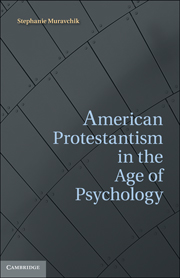Book contents
- Frontmatter
- Contents
- Acknowledgments
- Abbreviations
- 1 The Fall and Rise of Psychoreligious Cooperation
- PART ONE THERAPY AS MINISTRY IN CLINICAL PASTORAL EDUCATION
- PART TWO THERAPY AS FELLOWSHIP IN ALCOHOLICS ANONYMOUS
- 4 Democracy Is a Therapy
- 5 Came to Believe
- PART THREE THERAPY AS EVANGELISM IN THE SALVATION ARMY
- Bibliography
- Index
- References
5 - Came to Believe
from PART TWO - THERAPY AS FELLOWSHIP IN ALCOHOLICS ANONYMOUS
Published online by Cambridge University Press: 05 July 2011
- Frontmatter
- Contents
- Acknowledgments
- Abbreviations
- 1 The Fall and Rise of Psychoreligious Cooperation
- PART ONE THERAPY AS MINISTRY IN CLINICAL PASTORAL EDUCATION
- PART TWO THERAPY AS FELLOWSHIP IN ALCOHOLICS ANONYMOUS
- 4 Democracy Is a Therapy
- 5 Came to Believe
- PART THREE THERAPY AS EVANGELISM IN THE SALVATION ARMY
- Bibliography
- Index
- References
Summary
Alcoholics Anonymous did not believe that group therapy alone could turn drunkards into teetotalers. Nor could any other merely psychological or sociological phenomena exploited by Alcoholics Anonymous (AA). Most longer term members believed that the miraculous transformation of an inebriate into a sober citizen required “awakening” him to a “Higher Power” (which they usually called God). Thus joining AA entailed enrolling in a spiritual education, whether or not a newcomer wanted it. To help newer members overcome their spiritual reluctance, the fellowship developed a large body of oral and written advice encouraging emotional and intellectual openness to a Higher Power, prayer and meditation, the reading of religious and spiritual literature, the attendance of spiritual retreats and meetings, and apologetics. Most members did increase their level of faith and their participation in spiritual activities. Some, especially during mid-century, even returned or turned anew to conventional religious involvement.
The Tocquevillian Paradox
Whereas the “group therapy” of the program was immediately available to anyone who attended meetings, the “spiritual side” generally took more time and was more difficult to attain. In addition, the newcomers did not necessarily want to attain it. AA members usually went in spite of, not because of, AA's spirituality. As Bob A. in 1949 testified, “The new man has no religious creed. Nor does he want one,” and may, in fact, be discouraged by the “religious fervor he may encounter.”
- Type
- Chapter
- Information
- American Protestantism in the Age of Psychology , pp. 112 - 158Publisher: Cambridge University PressPrint publication year: 2011



